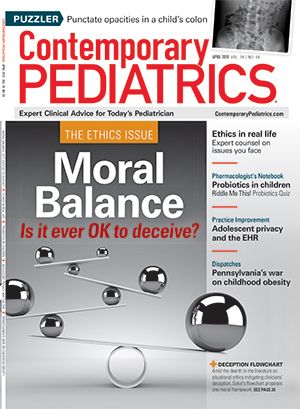Dr Farber’s parting words
Dr Farber presents some parting, philosophically oriented views on making sure we stay on the true path to best serve our patients and families.
This will be my final column for Contemporary Pediatrics for the foreseeable future. I appreciate the opportunity I have been given to share my thoughts on practicing pediatrics-the best of all professions-with you. Here I present some parting, philosophically oriented views on making sure we stay on the true path to best serve our patients and families.
1. Don’t assume we are out of the dark ages of medicine, now banished because of science. For example, the most recent statement on sudden infant death syndrome (SIDS) from the American Academy of Pediatrics (AAP) says that, ideally, infants should sleep close to the parents’ bed until aged 12 months, provoking comments that the data in support of this are weak and not based on studies conducted in this country.1
2. Along these lines, always remember that what you think you know may not be true. At the turn of the last century, ear/nose/throat (ENT) physicians knew that adults with large tonsils had problems, and the tonsils needed to be removed. When they saw a child in for a throat problem, and the child had large tonsils, the obvious conclusion-not knowing that this was normal in children-was that the tonsils needed to come out. This resulted in tremendous numbers of unnecessary tonsillectomies over the years.
The most egregious example of this is probably the tonsillectomy riots of 1906. That year, ENT volunteers, who thought they were providing a public service and doing good, went with strong assistants (to hold children still) to schools on the lower East Side in New York City. They then, free of charge, removed tonsils from many children on the school grounds, without anaesthesia.2 This was not favorably received by the parents.
3. This country is weak in science, either from lack of knowledge or an outright antiscience bias. Four well-written and entertaining books on the subject are the following (the last 2 deal directly with medicine): Science: Good, Bad, and Bogus by Martin Gardner; Galileo’s Revenge: Junk Science in the Courtroom by Peter W. Huber; Autism’s False Prophets: Bad Science, Risky Medicine, and the Search for a Cure by Paul Offit; and Hippocrates’ Shadow by David H. Newman.
4. A final thought, a common theme to many of my “pearls,” is one that is well worth emphasizing. Having gifted hands, or being brilliant, may be sufficient to make one a superior physician if you are a surgeon or running a diagnostic dilemma clinic. For those of us in everyday practice, however, our routine knowledge base is sufficient to handle the majority of what comes through our doors.
I know this is not easy, given the busy office setting, particularly if, like me, you are not naturally empathic. However, if you make it a priority, and work at it, it can be done, and the benefits to both you and the families you serve will be enormous.
References:
1. Task Force on Sudden Infant Death Syndrome. SIDS and other sleep-related infant deaths: updated 2016 recommendations for a safe infant sleeping environment. Pediatrics. 2016;138(5):e20162938.
2. Cone TE Jr. Dr. S. Josephine Baker and the tonsil and adenoid riot at a New York City Public school about 1920. Pediatrics. 1978;62(4):559.
